
SEMINAR 1: REIMAGINING AFRICAN TOURISM THROUGH DIGITAL TRANSFORMATION
OBJECTIVE:
To explore how cutting-edge digital technologies are revolutionizing the tourism sector across Africa, from enhancing traveler engagement to transforming business operations and how stakeholders can harness innovation to create resilient, inclusive, and globally competitive tourism ecosystems.
SUB THEMES:
- Artificial Intelligence And The Future Of African Tourism
- Digital Infrastructure and Connectivity: The Foundation for Smart Tourism
- E-commerce and Travel: Unlocking Value Through Online Marketplaces
- To Promote African Destinations Through Virtual Tours, AR/VR, and Gamification.
- Smart Destinations: Using IoT, Big Data, and Cloud Solutions in Tourism Management
- Sustainable Tourism Powered by Tech: Green Innovation and Digital Reporting
- Bridging the Digital Divide: Ensuring MSMEs and Local Communities Benefit
- Cybersecurity and Building Digital Trust: Protecting traveler data and enhancing confidence
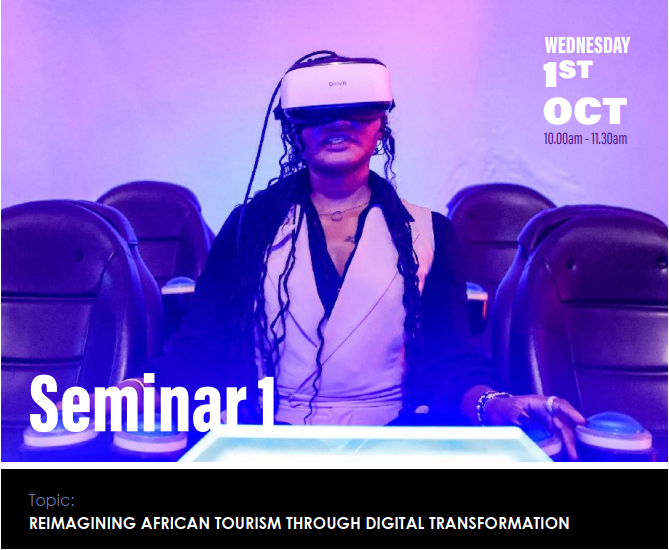
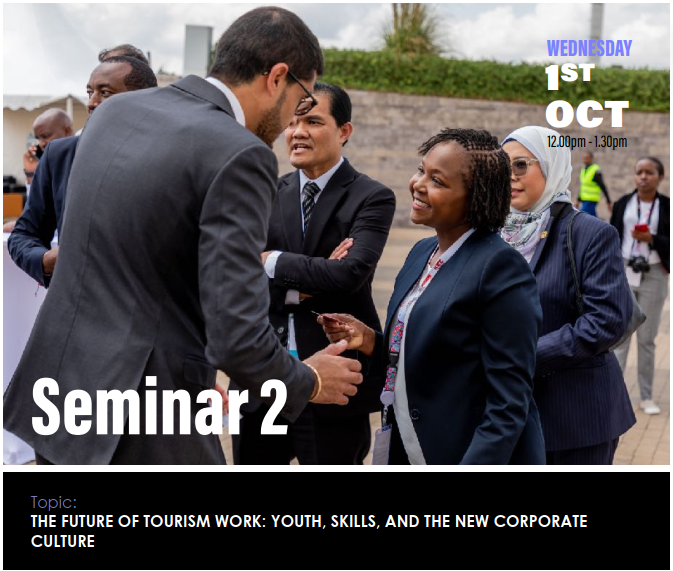
SEMINAR 2: THE FUTURE OF TOURISM WORK: YOUTH, SKILLS, AND THE NEW CORPORATE CULTURE
OBJECTIVE:
To explore how Africa’s tourism and hospitality sectors can build a future-ready
workforce by addressing skills shortages, embracing new work cultures, and meeting
the evolving expectations of Gen Z employees and entrepreneurs.
SUB THEMES:
- Upskilling Africa’s youth for future tourism careers (tech skills, soft skills, languages, service excellence)
- Innovative training models: public-private partnerships, vocational education, and entrepreneurial training
- Empowering the Next Generation: Navigating Career Pathways and Opportunities in the Evolving Tourism Industry
- Building inclusive, youth-friendly corporate cultures (diversity, equity, wellness, flexibility)
- Post-pandemic work environments: hybrid models, digital collaboration, new expectations (digital nomads).
- Talent retention strategies in hospitality and tourism (better working conditions, leadership development, career pathways)
- Regional qualification frameworks to harmonize skills recognition and promote labor mobility
- Youth-led entrepreneurship in tourism: startups, digital platforms, and creative economy links
SEMINAR 3: AFRICA'S LIVING CULTURE: STORYTELLING, SUSTAINABILITY & THE NEW TOURISM ECONOMY
OBJECTIVE:
To explore how African destinations can harness the continent’s full spectrum of adventure assets, cultural assets and ecosystems from heritage sites and culinary traditions to contemporary arts and creative industries that drives inclusive, sustainable tourism, reposition Africa globally, foster pride, preservation, intra-African Travel, and empower communities.
SUB THEMES:
- Adventure as Culture: Indigenous Knowledge, Landscapes & Safeguarding the Source: Adventure & Cultural Practices
- The Power of Story & Repositioning African Tourism: Rebranding Africa through Film, Music, Art & Digital Narratives.
- Creative Economies in Action: How Arts, Crafts & Design Drive Sustainable Tourism & Local Development.
- Building Bridges: Strengthening Intra-Africa Travel & Cultural Collaboration
- Truth in the Digital Age: Authentic Representation & Reputation Management
- Policy & Partnership: Government & UN Roles in Cultivating Cultural Tourism Ecosystems.
- Sustainable Community Tourism: Linking Heritage and Livelihoods
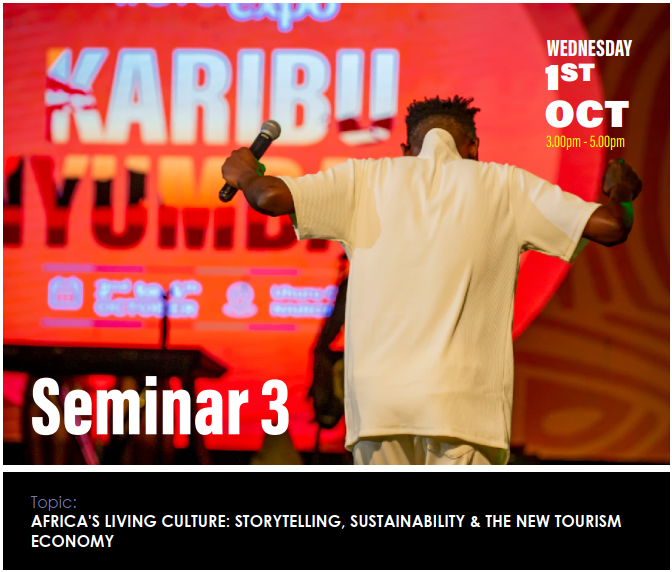

SEMINAR 4: SHAPING THE FUTURE OF AFRICA’S MICE INDUSTRY: GROWTH, TRENDS AND NEW OPPORTUNITIES
OBJECTIVE:
To explore the evolving landscape of Africa's Meetings, Incentives, Conventions, and
Exhibitions (MICE) sector, analyzing the trends driving its expansion and the strategic
investments required to position Africa as a global MICE destination.
SUB THEMES
- The MICE sector is becoming a powerful driver of economic growth, urban development, and tourism advancement in Africa
- As global interest in Africa rises, there is a need to strengthen MICE infrastructure, enhance professional capacity, and market African destinations as premier hosts for international business events.
- Effective collaboration between governments, private sector players, and global industry associations will be key to unlocking Africa's MICE potential.
SEMINAR 5: SUSTAINABILITY IN ACTION: TRANSFORMING AFRICAN TOURISM THROUGH CONSERVATION, COMMUNITY AND COLLABORATION.
OBJECTIVE:
To showcase practical and scalable sustainability models that drive responsible tourism growth, strengthen conservation efforts, and foster effective partnerships between the private sector, public institutions, and local communities.
SUB THEMES:
- Sustainable Tourism Masterplans: Aligning Growth with Green Goals
- Community-Led Conservation and Heritage Protection
- Eco-Innovation in Hospitality Design and Operations
- Building Private-Public Partnerships for Conservation Impact
- Marketing Africa’s Sustainability Story to Conscious Travelers
- Climate Adaptation: Future-Proofing Tourism Infrastructure
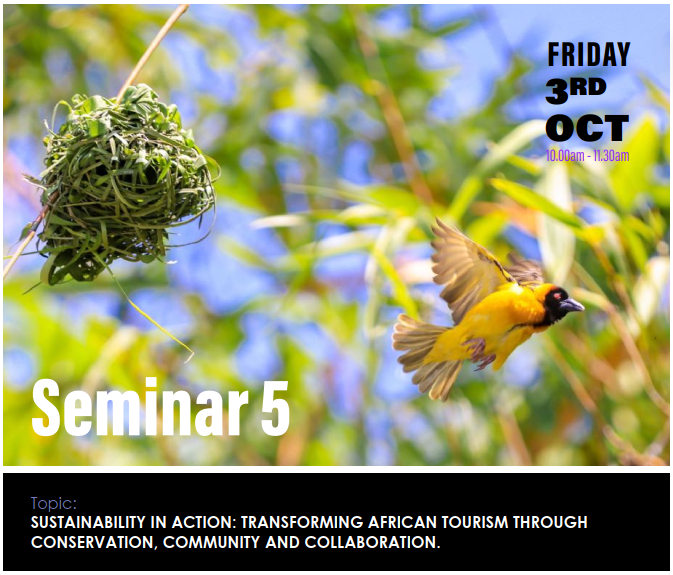
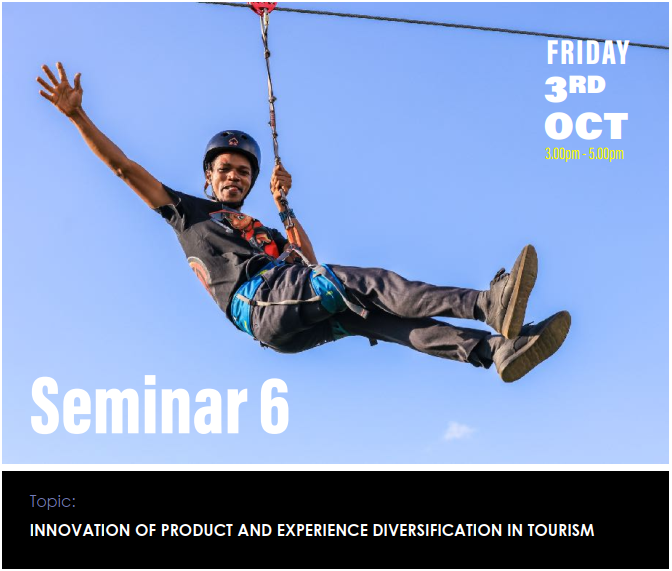
SEMINAR 6: INNOVATION OF PRODUCT AND EXPERIENCE DIVERSIFICATION IN TOURISM
OBJECTIVE:
To explore the evolving landscape of Africa's Meetings, Incentives, Conventions, and
Exhibitions (MICE) sector, analyzing the trends driving its expansion and the strategic
investments required to position Africa as a global MICE destination.
SUB THEMES:
- Cultural Storytelling: Using music, art, food, and heritage to develop unique tourism products and Rural & Community-Based Experience Innovation
- Agritourism and Eco Experiences: Farming, culinary trails, indigenous knowledge
experiences and sustainable rural tourism - Adventure tourism is the world’s fastest-growing segment (CAGR 17.4%), attracting
high-value, eco-conscious travelers - Creative Economies & Urban Tourism: Fashion, art, music, film, festivals, and youth driven urban culture
- Digital Innovation & Experience Packaging: Tech-enabled product creation, smart
tours, and experiential marketing. - Medical & Wellness Tourism: Africa’s emerging medical hubs, traditional healing
practices, wellness resorts, Spa retreats, cultural journeys and herbal therapies. - Designing for the Conscious Traveller: Story-driven, Regenerative, Impact Tourism,
Cross-border Experience Circuits and Multi-country Tourism Packages
